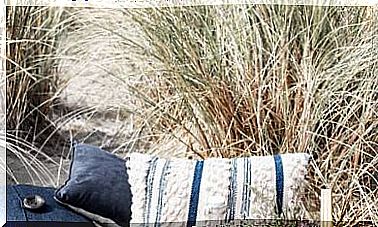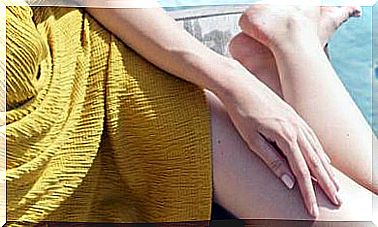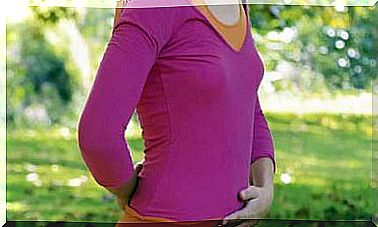What’s Behind A Bloated Belly?
Traditional Chinese medicine addresses abdominal bloating by correcting both dietary and lifestyle habits and emotional conflicts that can affect the flow of energy.

According to traditional Chinese medicine, the abdominal area belongs to the Zhong Jiao (Middle Warmer). There is an “organ”, with its own meridian, called San Jiao, which would be translated as Triple Burner. This “organ” is divided into three parts: Upper Jiao, Middle Jiao, and Lower Jiao. It is considered the messenger of the kidney and its main function is to channel and govern body fluids. In fact, it is not an organ but it fulfills a fundamental function of several organs together.
It is easily understood if the trunk is considered as an organ in itself: the upper part is Shang Jiao, with the lung and the heart; the middle part is Zhong Jiao, made up of the spleen / stomach, intestines and liver, and Xia Jiao, the lower part, consists of liver, kidney and bladder.
For the San Miao to function properly, strong kidney chi is needed, and the kidney needs to be fueled by terrestrial chi, which is generated by the spleen / stomach through food.
If the kidney chi is abundant, the three Jiaos work in harmony, but if the chi of the spleen and stomach is weak or stagnant, the body’s motor becomes paralyzed and then the movement of chi slows down and accumulates where it finds more space: in The abdomen.
The stomach, the center of life
The stomach is in the center of the body and in some way is the center of life: hence the wise saying “we are what we eat.” According to the theory of the five elements the spleen / stomach belongs to the element Earth. If the land is fertile, everything grows and sets in motion, food becomes nourishing blood.
The stomach is a yang organ and needs water to digest. However, an excess of water damages the chi of the spleen, especially if it is cold water, because it puddles the earth and drowns the harvest. And for the proper functioning of the stomach a good spleen chi is necessary.
Oppressed lung, dilated abdomen
The spleen is a yin organ and is paired with the stomach, but its function is entirely yang: it transforms food into chi and blood, and transports them to nourish the entire body.
It is like a motor that turns because the chi of the spleen rises while that of the stomach goes down: this continuous movement generates the heat necessary to transform food and transport nutrients.
The body needs the chi and blood generated by the spleen to feed it, so a very close link is formed between all the meridians: from the lung that generates the chi through breathing and from the spleen, which does it. from food.
The lung can become weak and cause stagnation. However, it does not cause swelling because it is lodged in the rib cage and cannot expand like the abdomen. For this reason, the stagnation of the lung produces a sensation of oppression, because it cannot open. The opposite happens in the abdomen.
A subtle balance
All vital organs are housed in the trunk and are protected by a solid structure, the rib cage. The five yin organs – lung, heart, liver, spleen and kidney – are located under the bone structure to ensure their safety.
Its functions are of impulse, generation, push, storage and transformation. The yang organs are of passage and emptying – large intestine, small intestine, gallbladder, stomach and bladder – and are located in the abdominal area, which allows them greater flexibility and mobility.
Paradoxically, all these yang organs are housed in the most yin part of the body, the belly, and that is the great mystery of the balance between yin and yang, the subtle but fundamental movement of coming and going, giving and receiving, shrinking and expanding, swelling. and deflate.
Hot food
Although it sounds contradictory, the best way to take care of the stomach, the yang organ, is in the yang way, that is, eating hot (cooked) and warm (by its nature) food. For example, for traditional Chinese medicine lettuce is a cold food compared to spinach. Watermelon is colder than apricot. Legumes are mainly neutral foods. The fruits are warmer than the leaves, and the roots, warmer than the trunks.
When eating hot food, the stomach does not have to make an extra effort to heat it up and digest it later. A large number of women suffer from bloating and poor digestion on the contrary: if they eat a lot of lettuce salad they suffer from aerophagia, and it is because the chi of the stomach is depleted and it cools before being able to heat and digest fresh or cold vegetables.
The correct direction for stomach chi is downward and for spleen chi upward. If stomach chi is blocked or deficient, it rises rather than falls, causing slow, heavy digestions, belching, a feeling of fullness, even burning and regurgitation into the throat. And the chi of the spleen instead of going up, goes down, causing abdominal distention. In case of loss of chi, diarrhea occurs and in case of stagnation, constipation.
Apart from food, there is another aspect that wears a lot of the chi in the spleen: worry. Each vital organ has a predominant emotion or thought and in the case of the spleen it is worry, which can turn into excessive reflection and finally an obsession.
It is a state of continuous wear and tear that I usually call “hamster syndrome”, because it is like when the little rodent enters the spinning wheel and is no longer able to stop running, without getting anywhere. This type of thinking causes the chi of the spleen to be used up to no avail. But in turn it happens because the chi is deficient, which sets the vicious circle in motion.
What to do to avoid swelling?
Exposed the causes, the solution is to modify what one can and wants. Correcting dietary habits is relatively easy but changing the way of being, thinking, the feelings that emerge from the gut, not so much anymore.
Many times we stay in the attempt or in the thought, we look for a thousand and one reasons not to change. For the “good of all” and not to upset anyone, we still prefer to swallow upset, anger, frustrations and unfair situations and not defend ourselves properly.
And although we realize it, we let the head go at a thousand an hour to get where we want, but we do not dare to take a single step. Between thinking, feeling and wanting, we move in three totally opposite directions, with which the energy loses all its strength because it is not channeled in a single direction.
It is a pity because we live in a well-off and protected environment. But the pace of life is too fast, we talk a lot without saying anything, we talk without being heard, we look without being seen, we eat without feeding and we sleep without a good night’s sleep.
The wrong management of water turns the land into a desert or a muddy place. We isolate ourselves more and more from the group to reduce ourselves to drops of water from the great river that is life.
The abdomen is where food is cooked and where life takes the form of chi and blood. It is the hearth of the body. And just like in a house, in the kitchen where there is a good fire, harmony tends to reign.
Let the energy flow
Abdominal bloating can be addressed by balancing the energies and emotions that converge in that area. Women tend to suffer more from abdominal bloating. We are a kind of representatives of the spleen – yin energy performing yang tasks.
Our essence is the water element, but we gestate and give life, so we are much more prone to wear out the chi of the spleen than men. Covering too many things and wanting to make everything perfect can lead us down the path of bitterness, and make us irritable and with little patience.
Bloating has to do with an energetic and emotional blockage
In Chinese, to refer to a patient person with good character, it is said that they have good spleen chi; On the other hand, someone who is impatient and angry is said to have an excess of liver fire. In both cases, the background is an energy blockage caused by a deficiency of spleen chi (improper eating habits or emotional disorders) and by blockage of liver chi (blood deficiency due to spleen weakness). These two organs make up most of the so-called Middle Jiao and there is a very close relationship between them.
The emotion that corresponds to the liver is anger, and it arises when this organ is not comfortable or cared for. Anger and worry are two emotions that affect us very often, although we may not realize that we are angry because we have hidden anger in other, less guilty or more elegant feelings.
In this way the tank of anger, frustration, guilt, disappointment, worry and helplessness is filled. This bag is like a load that is getting heavier and heavier and its presence impedes the flow of chi.









